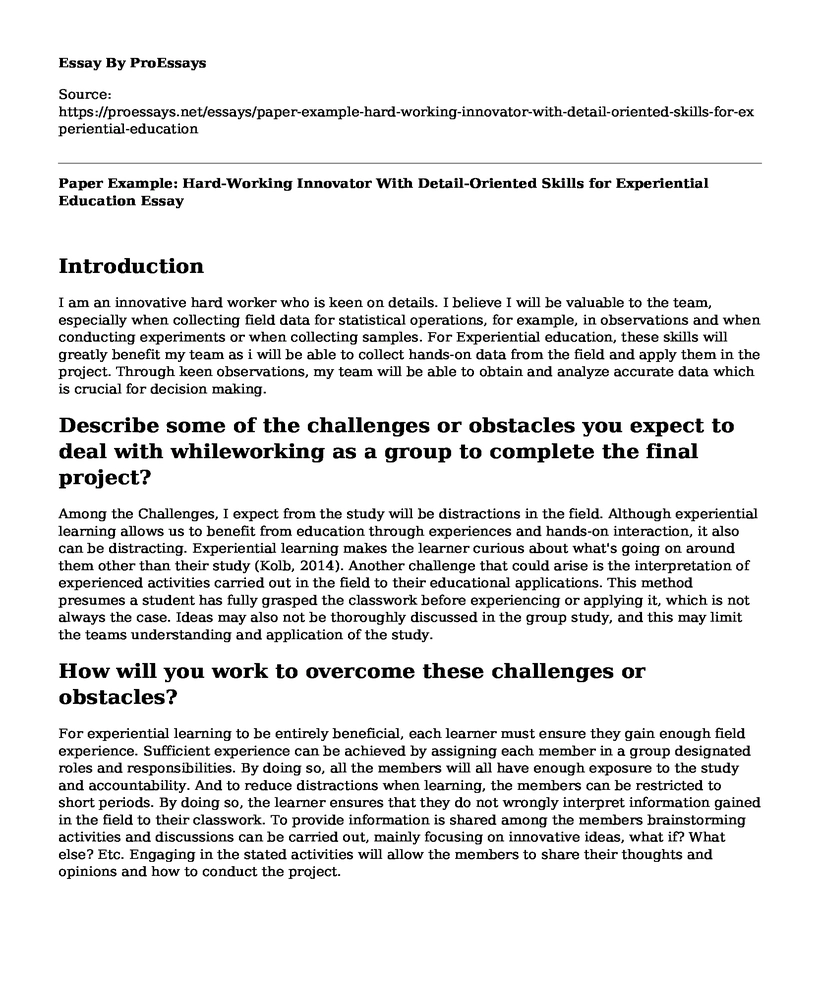Introduction
I am an innovative hard worker who is keen on details. I believe I will be valuable to the team, especially when collecting field data for statistical operations, for example, in observations and when conducting experiments or when collecting samples. For Experiential education, these skills will greatly benefit my team as i will be able to collect hands-on data from the field and apply them in the project. Through keen observations, my team will be able to obtain and analyze accurate data which is crucial for decision making.
Describe some of the challenges or obstacles you expect to deal with whileworking as a group to complete the final project?
Among the Challenges, I expect from the study will be distractions in the field. Although experiential learning allows us to benefit from education through experiences and hands-on interaction, it also can be distracting. Experiential learning makes the learner curious about what's going on around them other than their study (Kolb, 2014). Another challenge that could arise is the interpretation of experienced activities carried out in the field to their educational applications. This method presumes a student has fully grasped the classwork before experiencing or applying it, which is not always the case. Ideas may also not be thoroughly discussed in the group study, and this may limit the teams understanding and application of the study.
How will you work to overcome these challenges or obstacles?
For experiential learning to be entirely beneficial, each learner must ensure they gain enough field experience. Sufficient experience can be achieved by assigning each member in a group designated roles and responsibilities. By doing so, all the members will all have enough exposure to the study and accountability. And to reduce distractions when learning, the members can be restricted to short periods. By doing so, the learner ensures that they do not wrongly interpret information gained in the field to their classwork. To provide information is shared among the members brainstorming activities and discussions can be carried out, mainly focusing on innovative ideas, what if? What else? Etc. Engaging in the stated activities will allow the members to share their thoughts and opinions and how to conduct the project.
What is one skill that you would like to improve while completing the group project?
The primary skill I would like to advance in from the experiential study would be Quantitative data analysis. Quantitative data is data that is measured in terms of counts and values. This data is usually expressed in numerical form. Some of the conventional quantitative data analysis techniques employed include; frequency, which is defined as the number of times a specific value occurs. The percentage which is a tool used to express how an amount affects a larger respondent from which it is drawn. Quantitative data analysis involves data validation, editing, coding, etc. all of which are critical skills in the group project.
How do you think you could use the statistical skills you are learning in classin your daily life? (for example, in a work setting)
In a work setting, analytical skills have a range of applications regardless of the type and nature of the occupation. For example, probability can be used in stock market trading to estimate appropriate periods to buy or sell stock based on data acquired and experience. Frequency distribution skills can be used to when scheduling (Pestman, 2009) e.g., appointments. Forecasting and predictions are other useful applications of statistical skills. For example, a mathematical model that applies a simple moving average from data gained in the field can be used to predict events and weather occurrences. Experiential education also equips the learner with statistical skills that are not taught in learning institutions e.g., subjective probability. Subjective Probability which is centered around an individual own personal judgment and thinking is the probability that an outcome the individual is expecting comes true; this skill may help in reducing decision-making time.
References
Kolb, D. A. (2014). Experiential learning: Experience as the source of learning and development. Upper Saddle River, New Jersey: Pearson Education Inc.
Pestman, W. R. (2009). Mathematical statistics. Berlin: de Gruyter.
Cite this page
Paper Example: Hard-Working Innovator With Detail-Oriented Skills for Experiential Education. (2023, Feb 06). Retrieved from https://proessays.net/essays/paper-example-hard-working-innovator-with-detail-oriented-skills-for-experiential-education
If you are the original author of this essay and no longer wish to have it published on the ProEssays website, please click below to request its removal:
- Personal Essay Example on The Stone Mountain Park
- Introduction to English as a Global Language - Essay Sample
- Essay Example on Exploring Cognitive-Psychosocial Development: Vygotsky & Erikson
- iOmniscient: AI Technologies for Hosting Industries - Essay Sample
- Ethical Language Is Meaningless Essay
- Essay Sample on Children and Prejudice: A Study of Early Development
- Paper Sample on 8 Essential Elements of Thinking: A Framework for Critical Thinking







